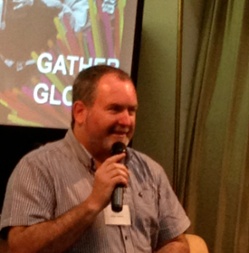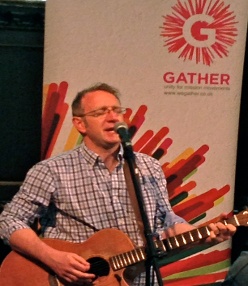Over 100 Gospel Movements in England
On April 30 and May 1, I was a speaker at the Gather Global Conference in London at the London Institute for Contemporary Christianity founded by John Stott. My presentation was on the expansion of Christian city movements internationally. What interested me, however, was what I was hearing in the many presentations from gospel movement leaders involved with purposeful church unity movements in cities and communities throughout England.
 The opening report came from Roger Sutton (in photo at the right), the leader of Gather UK, who hails from Manchester and works with the Evangelical Alliance. He told of the growth of Christian unity movements in England to the point where there are over 100 such movements today including over 20 in London.
The opening report came from Roger Sutton (in photo at the right), the leader of Gather UK, who hails from Manchester and works with the Evangelical Alliance. He told of the growth of Christian unity movements in England to the point where there are over 100 such movements today including over 20 in London.
There has been keen interest in these movements since the economic crash of 2008 and the British government’s decision to institute austerity measures rather than expand their currency as we have done in the U.S. The austerity plan meant that the British welfare system would be cut back substantially. For instance, the city government of Manchester has announced a second straight year of £80 million cuts.
At the same time, local church leaders have boldly stepped forward after years of developing a sense of church unity in pastors’ prayer groups to offer the volunteers of their church to serve their communities. Roger said that as they offered to serve the poor in cities, their focused collaboration was helped along by local governments that asked for one phone number to call when they have a need.
 The church is inherently decentralized and, in many cases, this has made it hard for congregations to serve together. However, in England, once the government and pastors confronted the new reality, they recognized that decentralized missional congregations were a strength offering many points of service in neighborhoods throughout cities and communities.
The church is inherently decentralized and, in many cases, this has made it hard for congregations to serve together. However, in England, once the government and pastors confronted the new reality, they recognized that decentralized missional congregations were a strength offering many points of service in neighborhoods throughout cities and communities.
The government went two steps further to assist in the transition. First, they began to offer congregations micro-grants of £500-£1,500 through intermediary groups like the Cinnamon Network. This network offers motivational videos and concrete plans for churches to initate and strengthen volunteer mobilization to serve people in their city or community. (Pictured left: Musician Andy Flannagan led worship at the Gather Global Conference.)
Second, local governments have been transferring assets to community organizations at greatly reduced prices. The Localism Act of 2011 recognized that local “…councils are facing intense financial pressure, resulting in the need to maximise the use of publicly-owned land and buildings, or dispose of them and their associated costs, wherever possible.” This has opened the door to community groups such as church coalitions being able to purchase or in some cases being given community centers, libraries, and other community assets provided that they will engage volunteers or staff to provide enhanced services to the community.
This combination of the willingness of missional churches to engage their members in service and the ownership of facilities to serve their communities more effectively is contributing to a revival of faith in churches across England. The stories are numerous and many can be accessed through articles and videos on the www.wegather.co.uk web site.
I was greatly encouraged by the stories I heard in London. In the next several blogs, I’ll share more stories and videos from my trip to England. Also, some of you will be happy to know that we are working to bring some these leaders to our City Advance Meetings in New York City October 21-22 including Andy Flannagan to lead worship. I hope to see you there!
(Pictured below: the sign outside the London Institute for Contemporary Christianity where the Gather Global Conference was held.)

